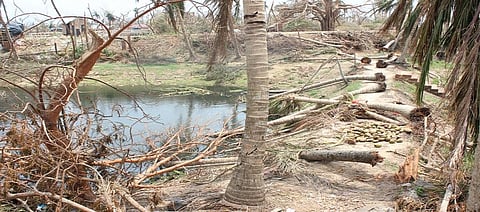

Cyclone Fani, the second-most powerful cyclone to have hit Odisha, has uprooted about 14 lakh coconut trees, affecting around 50,000 coconut farmers in the state. The storm, which made landfall in Puri on May 3, 2019 with a wind speed of 175 kilometres per hour, rampaged nearly 8,000 hectares of coconut farms,
“The recent cyclone has come as a bolt from the blue and left us devastated as all the 27 coconut trees in my farm were uprooted,” said Bijaya Pradhan, a coconut farmer of Sakhigopal in Puri district.
Coconut is the secondary crop of the state after rice, which is regarded as the main food grain. “This is a difficult time for coconut farmers. The impact of this loss will surely be felt on the agricultural economy as they will find it hard to recover from this blow," said Umesh Chandra Singh, a farmers’ leader and vice-president of Krusaka Sabha, state unit of farmers' front.
According to the latest enumeration data compiled by the horticultural department, the high-velocity winds during Cyclone Fani damaged 13.87 lakh coconut trees in the state covering 7,930 hectares.
In the worst-hit Puri district, 11.59 lakh coconut trees were damaged, 1.96 lakh were uprooted in Khurdha district, Jajpur district saw 14,910 cocnut trees fall, 10,500 in Kendrapara district, 5,075 in Cuttack district and 1,575 in Jagatsinghpur district. "Last year, the state's coconut farmers had earned around Rs 40 crore by selling coconuts. But now their fate is hanging in balance," said Naba Kumar Tad, deputy director at state's horticulture department.
The department has, meanwhile, fixed the compensation amount at Rs 1,600 per coconut tree that fell during the cyclone, and also plans to provide coconut saplings to affected farmers.
However, coconut farmers allege that the compensation is too low as a coconut tree is a source of revenue for a number of years. “A new coconut tree takes around five to seven years to grow fully and then bears fruit. The government should provide us Rs 4,000 as compensation for the damage of a coconut tree,” said Arabinda Mandal, a coconut farmer in Jamboo village in Kendrapara district.
To plant a new batch of coconut trees, farmers first need to clear off the debris in their farms. Although the government has cleared roads blocked by fallen trees, the damaged coconut farms are yet to be cleared, added Mandal.
Fani meandered over the sea and land for 11 days, making it the longest-lived cyclone in the Bay of Bengal ever observed. Besides coconut farms, the cyclone also damaged weavers’ looms, betel vineyards, craftsmen’s tools, trees and fishermen’s boats and have left agricultural fields inundated.
Although the government succeeded in saving lives of people, but, most of them, though survived, are not left with any means to sustain themselves.